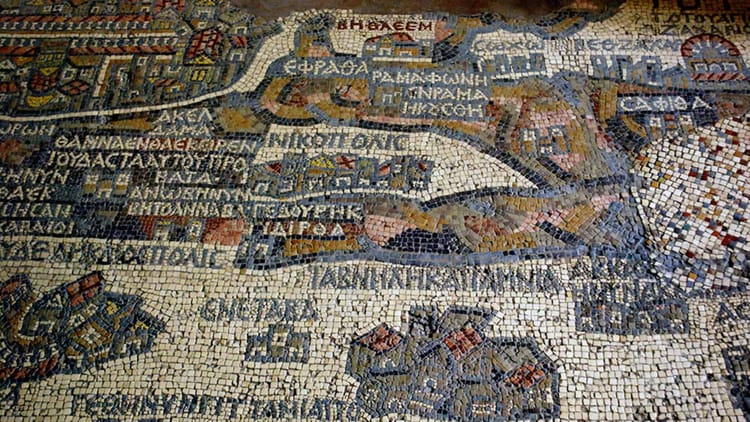At the End of Hope (Micah 5)


One of the best books I read this year was Unbroken: A World War II Story of Survival, Resilience, and Redemption. It’s the true story of Louie Zamperini, a rebel child who became an Olympic runner, and who later became a prisoner in one of Japan’s most brutal POW camps.
Near the end of the book, Louie has survived the war. He’s married and he has a young daughter. But his life is a mess. Every night he’s haunted by dreams that he can’t escape. He wakes up one night from a dream and finds that he’s choking his wife. He is completely shattered emotionally and struggling with alcoholism. “He was drinking heavily, slipping in and out of flashbacks, screaming and clawing through nightmares, lashing out in fury at random moments.” Eventually his life became completely unbearable. His wife, after doing all that she could to persist, left him. Louie had survived a war, but he couldn’t survive the aftermath. He is utterly shattered.
The reason I bring that up is because I know a lot of people who have the same story. The details are different, but the stories are the same. Having survived and suffered much, they get to the end of their resources and find there is no hope. We’re not talking about a temporary setback here. We’re talking a complete and utter collapse of one’s life; the complete loss of hope; complete and utter despair.
Complete Collapse of Hope
The passage we read this morning begins with this very situation. Micah 5:1 says this:
Marshal your troops now, city of troops,
for a siege is laid against us.
They will strike Israel’s ruler
on the cheek with a rod.
Let me set the scene for you. Israel had gone from being a great nation to the edge of ruin. As Micah prophesies, the heyday of King Uzziah’s reign is over. Assyria has become a new world power. The old world of relative security is over, and a new world of uncertainty is here, and Assyria is a major threat. The people were relatively wealthy and comfortable, but it all looked like it could come to a sudden end.
So what’s the message? You can endure bad news with a little bit of hope. It only requires a little hope. God has shown himself more than equal to the challenges that Israel has faced. No matter how bad things may seem, there’s always hope when God comes through.
But that’s not the message of Micah. Micah actually says that God is against his people. Micah brings a series of oracles against Jerusalem. And leading up to chapter 5 Micah makes it very clear that war is coming to Jerusalem. Nations will approach in battle. They will lay siege to Jerusalem, and according to verse 1, the Assyrians will defeat Israel’s leader with contempt. Not only will they defeat him, but they’ll strike his cheek with a rod. Being struck with a rod on the cheek was a sign of great humiliation. The news is not good.
This is not the news that they wanted to hear. What makes it worse is that other prophets – false ones – were bringing messages of hope. Micah is saying, in contrast, that the kingdom of Israel is going to be destroyed. They were going to be ruined. Jerusalem was about to face a siege of terror, death, and destruction. It was not good news for Jerusalem.
Sitting here some 2,500 years later, it’s hard to get very worked up about the collapse of Jerusalem. But the collapse of Jerusalem is indicative a problem we do face: coming to the place in which everything is lost. For the people of Jerusalem, it meant that their identity and security was going to be lost. Everything they knew was going to be taken away. More than that, their aspirations would never be met. Their hopes as a people, as God’s people, were lost as they realized that, in a sense, God had turned against them.
For us, it won’t be exactly the same. But some of you have reached the point of losing your identity and security and your aspirations. For some of you the story of Louie Zamperini won’t be unfamiliar to you. Again, the details of your story are different, but you know what it’s like to reach the end of hope.
Some of you are there this morning. You can relate to the story of Louie Zamperini. You’ve already reached the end. Some of you have experienced the end of a marriage, the end of a career, the end of health, the end of hope. That’s exactly the situation that Micah is describing.
What do you do when you come to the end of hope?
Hope At the End of Hope
It’s in that contest that we read these famous words in verses 2-4:
But you, Bethlehem Ephrathah,
though you are small among the clans of Judah,
out of you will come for me
one who will be ruler over Israel,
whose origins are from of old,
from ancient times.
Therefore Israel will be abandoned
until the time when she who is in labor bears a son,
and the rest of his brothers return
to join the Israelites.
He will stand and shepherd his flock
in the strength of the LORD,
in the majesty of the name of the LORD his God.
And they will live securely, for then his greatness
will reach to the ends of the earth.
One of the most significant words in this passage is the one at the beginning of verse 2: “But.” What this means is that the hopeless situation is not the end of the story. We’re about to see a reversal from a hopeless situation to hope.
And the hope is a person. Most of us are cynical about new leaders. If you’ve been around long enough, the new guy seems just like the old guy. We’ve seen changes in government enough to know that it’s hard to pin our hopes on someone new.
But Micah says that this king will be like no other. Micah tells us three things about this king: where he comes from; what his heritage is; and what he’s going to do.
First: where he comes from. Micah says that this king will come from Bethlehem Ephrathah, “small along the clans of Judah.” Of all the clans of the tribe of Judah, the Ephrathite clan around Bethlehem would hardly supply a respectable army unit at times of tribal levy. It was one of the smallest families. Bethlehem was one of the most unlikely places. It was so small, it hardly made the maps. It’s the most unlikely place. Yet it’s also the place where King David was born. Micah is saying that this king comes from the most inauspicious place, and yet has the most auspicious origins. He’s the king from nowhere, and yet the greatest king in Israel’s history was also from the same nowhere.
But then we also learn about his heritage. We already have a hint with him being born in Bethlehem. But then you also have a puzzling phrase: “whose origins are from of old, from ancient times.” What does that mean?
There are two schools of thought. One is that it’s a reference to his ancient origins. It could be a reference to this coming king’s connection to an ancient royal lineage that’s traced all the way back to King David.
But other people see it differently. They see this as a sign that this coming ruler existed from ancient times, that he existed before he existed in a sense. He didn’t just come into existence when he was born; he existed long before his life on this earth began. In other words, he is more than a mere human.
Which is it? From an ancient royal lineage, or pre-existent? Yes. We’re going to see in a minute that this promised king is from David’s line, and yet he is more. He existed before he was born, before this world was made. He is the once and future king.
We’ve seen where he’s from, and we’ve seen his heritage. Micah also tells us what he’ll do. He’ll rule over Israel, verse 2 says. He’ll reunify the divided kingdom, verse 3 says. At that time Israel was divided into the northern and southern kingdom. Not only will he unify them, he will shepherd them, and they will live securely. And, we read in verse 4, his greatness will reach the ends of the earth. He rid Israel of its enemies, and purge Israel of its idolatry. He is a king like no other.
In other words, at the end of hope, when there is no hope, God will send an unlikely king. And not only will this king save Israel, he’ll ultimately be the Savior of the entire world.
Who is this king? In Matthew 2 we read that Magi came from the east in search of a king who had been born king of the Jews. They assembled all the biblical scholars to try to figure out where such a king would be born. The biblical scholars said:
“In Bethlehem in Judea,” they replied, “for this is what the prophet has written:
‘But you, Bethlehem, in the land of Judah,
are by no means least among the rulers of Judah;
for out of you will come a ruler
who will shepherd my people Israel.'”
(Matthew 2:5-6)
Do you know what Matthew is saying as he recounts the search of the Magi and the testimony of the biblical scholars? Jesus is that king.
He is from Bethlehem. God in his sovereignty used a census so that Mary and Joseph, who lived 110 kilometers away on foot, would fulfill the prophecy.
He was from David’s line. Do you ever wonder what all the genealogies are about? If you read the genealogy in Matthew 1, you’ll see that Matthew traces Jesus’ lineage all the way back to David. Jesus is born of Bethlehem, where David was born, and he comes from the royal lineage of David.
Not only that, but he is the king who existed and ruled before he was born. His origins were of old, from ancient days. All throughout the Bible, we’re told about Jesus who existed before the world began. When God identified himself to Moses, he said that his name was “I AM.” In John 8:58, Jesus told religious leaders, “Before Abraham was born, I am!” In his high priestly prayer in John 17, he prayed, “And now, Father, glorify me in your presence with the glory I had with you before the world began” (John 17:5). The Gospel of John begins:
In the beginning was the Word, and the Word was with God, and the Word was God. He was with God in the beginning. Through him all things were made; without him nothing was made that has been made. (John 1:1-3)
And he is the King of Kings. He is seated today at the right hand of God. In Revelation 11:15 the angels proclaim:
The kingdom of the world has become
the kingdom of our Lord and of his Messiah,
and he will reign for ever and ever.
What do we do with such a King? Years ago in England, Charles Simeon said we should do two things as we read Micah 5. First, adore him for his condescension and love. Adore him for coming to earth and humbling himself to become one of us, God in the flesh. But secondly:
Let us submit to his government– Do we look for salvation through our adorable Emmanuel? Let us not forget that he came to be “a Prince as well as a Savior,” a “Ruler” as well as an Instructor. Let us willingly receive him in this character, and cheerfully dedicate ourselves to his service. Let us be his subjects, not in name, but in truth; not by an external profession only, but an internal surrender of our souls to him: let us do this, not by constraint, but willingly; not partially, but wholly, and without reserve. This is our first duty; this is our truest happiness; this is the way in which he expects us to requite him for all his condescension and love; and it is the only way wherein we can manifest our sense of the obligations he has conferred upon us.
When there’s no hope, God sends an unlikely King as Savior of the world.
Remember that Louie Zamperini was hopeless. He was suffering the effects of post-traumatic stress. He had slid into alcoholism. He had pretty much lost his family.
But one day his wife was in town. She was staying until she could arrange a divorce. They heard about this new evangelist called Billy Graham. Graham was virtually unknown in those days. Graham preached, and Louie got mad. The next day his wife tried to get him to go hear Graham again. Louie refused, but his wife wore him down. As he was bolting out of that meeting, something happened. God got hold of him. In a circus tent in downtown Los Angeles, Louie came to know this King, and it changed him forever. The flashbacks stopped. He threw out all his liquor and girlie magazines. The next morning he woke feeling cleansed.
Resting in the shade and the stillness, Louie felt a profound peace. When he thought of his history, what resonated with him was not all that he had suffered but the divine love that he believed had intervened to save him. He was not the worthless, broken, forsaken man…In a single, silent moment, his rage, his fear, his humiliation and helplessness, had fallen away. That morning, he believed, he was a new creation.
Softly, he wept. (Unbroken)
At the end of hope, Micah tells us, God sends an unlikely King as Savior of the world, and to be your Savior too.





